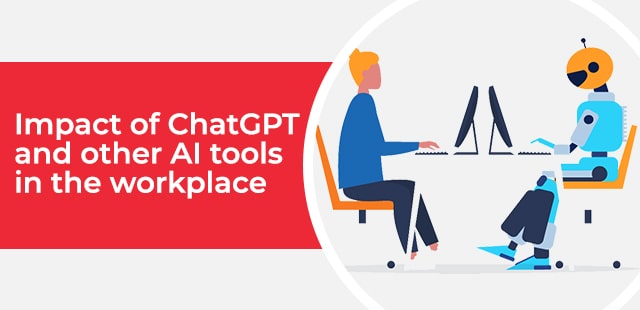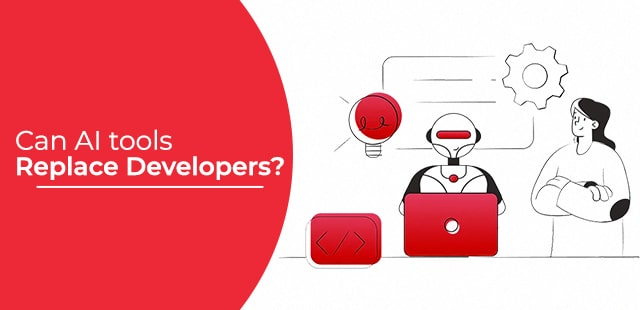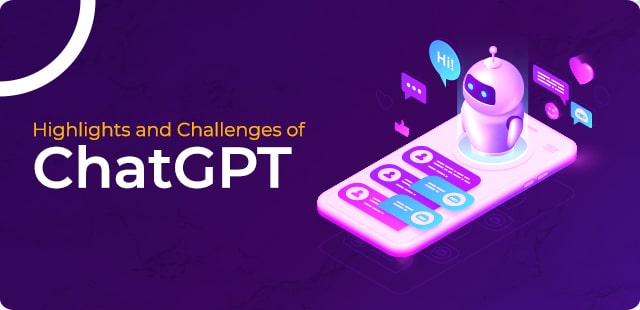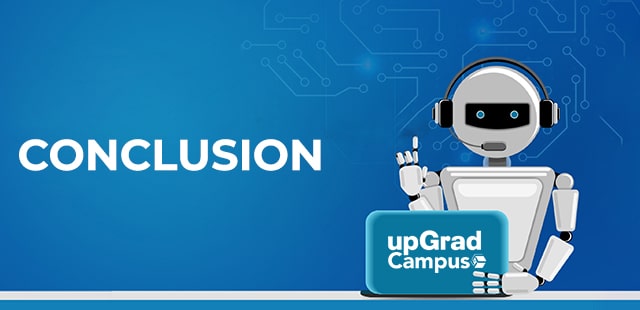Blog > Impact of ChatGPT and other AI tools in the workplace
Impact of ChatGPT and other AI tools in the workplace
April 28th, 2023

Table of Contents
“Is AI going to take over human intelligence?” or “Will AI lead to mass unemployment in the marketing sector?”. Today, evolution in AI is a matter of concern for many working professionals or students choosing their career path. Especially after the introduction of ChatGPT 3.5.
In recent years, Artificial Intelligence has developed significantly shaping various industries and workplaces. AI has become a big subject in the tech industry as now it is involved in doing a lot of work which previously needed human intelligence.
AI offers a helping hand everywhere - from basic tasks like turning off the lights to more complex functions like developing apps and websites or security-led programming. This has led to speculation that AI tools will eventually replace developers, making programming a thing of the past.
The answer to these questions lies deep into understanding how AI works and how AI is going to be placed in the upcoming market. In this blog, we will explore the impact of AI on the workplace and how artificial intelligence certification can prepare developers for the future.
Gradually, these tools are undergoing massive improvements and are in great need in the current market, leading to a rise in demand for artificial intelligence courses. Many AI tools like Siri, Alexa, Grammarly, Dall-E, Jasper came in the market and became an indispensable part of everyday work. The development of ChatGPT was part of a larger effort to improve AI's ability to process and understand natural language.
Prior to the introduction of ChatGPT, Natural Language Processing (or NLP) models were limited in their ability to understand and respond to complex natural language inputs. ChatGPT's development represented a significant advancement in NLP, as it could generate coherent and natural language responses to a wide variety of input prompts. Its ability to generate human-like responses has made ChatGPT a valuable tool in improving the customer experience and streamlining communication between humans and machines.
However, in today’s market, ChatGPT is standing as a great question mark on its impact on the human workforce, leading to more students signing up for artificial intelligence courses. Despite its many capabilities and a great working potential, it is hard to definitively say that it can ever replace developers. Let us see why.

Firstly, it's important to understand what AI tools are and what they can do.
For example, some AI tools can generate code based on natural language descriptions of what the code should do, while others can identify and fix errors in code.While AI tools can automate some aspects of software development, they cannot replace developers entirely.
Here are some reasons why:
Creativity and Problem-Solving Skills: One of the most important skills that developers possess is creativity. They can come up with innovative solutions to problems that AI tools may not be able to handle.
Developers can also understand the context of a problem and are able to apply their knowledge to find the best solution. AI tools, on the other hand, are limited by their algorithms and cannot think outside the box.
Flexibility: Developers need to be able to adapt to new situations and learn new skills quickly. They need to be able to work with new technologies and programming languages as they emerge. While AI tools can be trained on new data, they cannot adapt to new situations as quickly as humans.
Communication and Collaboration: Developers often work in teams, collaborating with designers, project managers, and other developers. They need to be able to communicate effectively and work together to achieve a common goal. While AI tools can assist in some aspects of software development, they cannot replace the human element of communication and collaboration. So, if you are going for artificial intelligence certification do remember to master soft skills with hard skills.
Ethics and Responsibility: Developers are responsible for ensuring that their code is ethical and does not harm users. They need to be aware of the social and ethical implications of their work. AI tools, however, are not capable of making ethical decisions or understanding the consequences of their actions.
AI tools can assist in some aspects of software development. For example, they can automate repetitive tasks such as testing and debugging, freeing up developers to focus on more creative work. They can also help identify security vulnerabilities and suggest improvements to code. For a better understanding, let’s check the uses and limitations of ChatGPT.

ChatGPT, like any other AI tool, is useful in many aspects but comes with its own sets of limitations. Here are some of the key uses and limitations of ChatGPT:
Overall, developers are creative problem solvers who can think outside the box, understand the context of software development, adapt to new technologies, collaborate effectively with others, and consider the ethical implications of their work. Until ChatGPT or any other AI tool doesn’t imbibe these traits, it is safe to say that human software developers will still be in need. However, companies will always be on the lookout for professionals who can work hand-in-hand with AI.
If you want to be this professional, then you should go for the upGrad Campus artificial intelligence certification. This course helps developers stay up-to-date with the latest AI technologies and prepare for the future. Be ready for the future, act today by talking to our experts.
- Introduction
- Most Popular AI Tools
- Highlights and Challenges of ChatGPT
- Can AI tools Replace Developers?
- Conclusion
“Is AI going to take over human intelligence?” or “Will AI lead to mass unemployment in the marketing sector?”. Today, evolution in AI is a matter of concern for many working professionals or students choosing their career path. Especially after the introduction of ChatGPT 3.5.
In recent years, Artificial Intelligence has developed significantly shaping various industries and workplaces. AI has become a big subject in the tech industry as now it is involved in doing a lot of work which previously needed human intelligence.
AI offers a helping hand everywhere - from basic tasks like turning off the lights to more complex functions like developing apps and websites or security-led programming. This has led to speculation that AI tools will eventually replace developers, making programming a thing of the past.
The answer to these questions lies deep into understanding how AI works and how AI is going to be placed in the upcoming market. In this blog, we will explore the impact of AI on the workplace and how artificial intelligence certification can prepare developers for the future.
Most Popular AI Tools
Artificial intelligence or AI tools are introduced to make working easier and efficient for the workforce and to adroitly perform tasks which were tough and time consuming when done manually.Gradually, these tools are undergoing massive improvements and are in great need in the current market, leading to a rise in demand for artificial intelligence courses. Many AI tools like Siri, Alexa, Grammarly, Dall-E, Jasper came in the market and became an indispensable part of everyday work. The development of ChatGPT was part of a larger effort to improve AI's ability to process and understand natural language.
Prior to the introduction of ChatGPT, Natural Language Processing (or NLP) models were limited in their ability to understand and respond to complex natural language inputs. ChatGPT's development represented a significant advancement in NLP, as it could generate coherent and natural language responses to a wide variety of input prompts. Its ability to generate human-like responses has made ChatGPT a valuable tool in improving the customer experience and streamlining communication between humans and machines.
However, in today’s market, ChatGPT is standing as a great question mark on its impact on the human workforce, leading to more students signing up for artificial intelligence courses. Despite its many capabilities and a great working potential, it is hard to definitively say that it can ever replace developers. Let us see why.
Can AI tools Replace Developers?

Firstly, it's important to understand what AI tools are and what they can do.
| AI tools are software programs that use machine learning algorithms to automate tasks that would normally require human intelligence. |
For example, some AI tools can generate code based on natural language descriptions of what the code should do, while others can identify and fix errors in code.While AI tools can automate some aspects of software development, they cannot replace developers entirely.
Here are some reasons why:
Creativity and Problem-Solving Skills: One of the most important skills that developers possess is creativity. They can come up with innovative solutions to problems that AI tools may not be able to handle.
Developers can also understand the context of a problem and are able to apply their knowledge to find the best solution. AI tools, on the other hand, are limited by their algorithms and cannot think outside the box.
Flexibility: Developers need to be able to adapt to new situations and learn new skills quickly. They need to be able to work with new technologies and programming languages as they emerge. While AI tools can be trained on new data, they cannot adapt to new situations as quickly as humans.
Communication and Collaboration: Developers often work in teams, collaborating with designers, project managers, and other developers. They need to be able to communicate effectively and work together to achieve a common goal. While AI tools can assist in some aspects of software development, they cannot replace the human element of communication and collaboration. So, if you are going for artificial intelligence certification do remember to master soft skills with hard skills.
Ethics and Responsibility: Developers are responsible for ensuring that their code is ethical and does not harm users. They need to be aware of the social and ethical implications of their work. AI tools, however, are not capable of making ethical decisions or understanding the consequences of their actions.
AI tools can assist in some aspects of software development. For example, they can automate repetitive tasks such as testing and debugging, freeing up developers to focus on more creative work. They can also help identify security vulnerabilities and suggest improvements to code. For a better understanding, let’s check the uses and limitations of ChatGPT.
Highlights and Challenges of ChatGPT

ChatGPT, like any other AI tool, is useful in many aspects but comes with its own sets of limitations. Here are some of the key uses and limitations of ChatGPT:
Uses of ChatGPT
- Chatbots and virtual assistants: ChatGPT is commonly used to develop chatbots and virtual assistants that can engage in natural language conversations with humans.
- Customer service: ChatGPT can be used to provide automated customer service by responding to common inquiries and providing helpful information.
- Language translation: ChatGPT can be used to translate text from one language to another, making it useful for communication across different languages.
- Personalization: ChatGPT can be used to personalise the user experience by understanding user preferences and tailoring responses accordingly.
Limitations of ChatGPT
- Lack of context: ChatGPT may sometimes lack the contextual understanding needed to provide accurate responses. This may lead to a non-relevant or unsatisfactory response.
- Biases: ChatGPT may exhibit biases in its responses due to biases in the training data or the way the model was developed.
- Limited understanding of the world: ChatGPT has limited understanding of the world outside of the data it was trained on. This can lead to a lack of understanding of certain concepts or events.
- Conditioned to training data: ChatGPT purely works on training data and continuously works on self-improvements. But it significantly lacks common sense and without sufficient and diverse data, its performance may be limited.
Conclusion

Overall, developers are creative problem solvers who can think outside the box, understand the context of software development, adapt to new technologies, collaborate effectively with others, and consider the ethical implications of their work. Until ChatGPT or any other AI tool doesn’t imbibe these traits, it is safe to say that human software developers will still be in need. However, companies will always be on the lookout for professionals who can work hand-in-hand with AI.
If you want to be this professional, then you should go for the upGrad Campus artificial intelligence certification. This course helps developers stay up-to-date with the latest AI technologies and prepare for the future. Be ready for the future, act today by talking to our experts.






Add a Comment